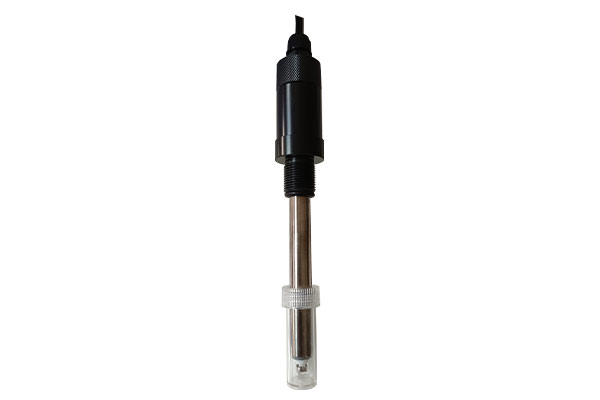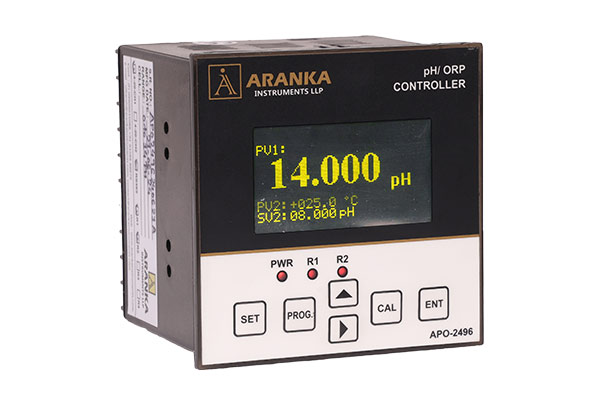

Residual Chlorine Analyzer Manufacturer
We are a leading Residual Chlorine Analyzer manufacturer and supplier in Ahmedabad, Gujarat, offering advanced liquid chlorine sensors designed for accurate and real-time monitoring of chlorine levels in water. These analyzers use amperometric sensing technology, which measures the electrical current generated when chlorine reacts with the sensing electrode — a process directly proportional to chlorine concentration. Ideal for drinking water treatment, swimming pools, wastewater systems, and industrial processes, our analyzers ensure effective disinfection control and water quality management.
The AIUA2496 Controller, when combined with the AILHF24900 sensor and flow cell, precisely measures residual chlorine concentration in water. Featuring a membrane-free constant voltage sensor, it eliminates the need for membrane and reagent replacement, offering high sensitivity, excellent stability, and easy maintenance. Engineered for continuous monitoring and process safety, this analyzer provides a cost-effective and long-lasting solution for chlorine measurement in modern water treatment and industrial systems.
Type of Chlorine Sensor
- Chlorine sensors, especially for residual chlorine monitoring, typically employ an amperometric measurement principle.
- This involves a chemical reaction between chlorine and the sensor’s working electrode, generating a current.
- The sensor’s design includes a working electrode (often made of gold), a reference electrode, and a counter electrode.
- The working electrode is coated with a chlorine-sensitive layer, and the reference electrode provides a stable voltage for the measurement.
- The measured current, which is directly proportional to the chlorine concentration, is then converted to a usable reading.
- Many liquid chlorine sensors utilize a membrane to separate the measured liquid from the sensor’s internal components.
- This membrane is typically gas-permeable, allowing chlorine to diffuse through it and reach the electrode surface.
- This diffusion process is a key aspect of how these sensors work, ensuring the chlorine comes into contact with the electrode for measurement.
- In the case of residual chlorine sensors, dissolved chlorine in the water diffuses through the membrane and reaches the working electrode.
- A voltage is applied, and this causes a reduction reaction where chlorine is reduced to chloride.
- The resulting electrical current is directly proportional to the chlorine concentration in the water.
- Accuracy and Reliability
- Front Key Calibration and Low Maintenance
- Fast Response Time
| Power Supply | 100 ~260 VAC @ 50Hz OR 24VDC | |
| Measuring Range | 0.00 ~20.00 mg/l | |
| Accuracy | +/- 3% F.S | |
| Display | OLED LCD | |
| Output | 2 nos. Relay 3A 1CO | |
| Communication | RS485 Modbus RTU | |
| Analogue output | 4-20mA | |
| Resolution | 0.01 mg/l | |
| IP Rating | IP55 | |
| Enclosure | ABS | |
| Operating Temperature | -10 ~55’C | |
| Size | 96x96x85mm | |
| Panel Cut out | 92×92 mm | |
CE Approved
ISO 9001 : 2025
Drinking Water: Ensuring adequate disinfection and preventing overdosing
Wastewater: Monitoring effluent discharge to ensure compliance with regulations and enable water reuse.
Process Water: Maintaining chlorine levels in industrial processes like cooling towers to prevent damage and optimize treatment.
Food and Beverage: Ensuring hygiene in washing water, protecting membranes in reverse osmosis systems, and monitoring disinfection.
Paper and Pulp: Monitoring chlorine levels in bleaching processes.
Chemical Manufacturing: Controlling chlorination processes.
Frequently Asked Questions (FAQs)
What is a residual chlorine analyzer?
A residual chlorine analyzer is an instrument that continuously measures the concentration of free or residual chlorine in water. It helps ensure effective disinfection while avoiding excessive chlorine that could be harmful.
Which sensing method does the analyzer use?
The analyzer uses amperometric sensing technology — by applying a voltage to an electrode, the sensor measures the current generated by the chlorine reaction, which is directly proportional to the concentration of chlorine in the water.
What is the role of the AIUA2496 controller?
The AIUA2496 is the controller unit that receives the signal from the sensor (AILHF24900 with flow cell), processes it, displays chlorine levels, and provides analog, relay, and digital outputs for external monitoring and control.
Why membrane-free constant voltage sensor?
The sensor is membrane-free, so it does not require membranes or reagents that often need replacement in conventional sensors. The constant voltage design provides stable measurement over time with minimal maintenance.
What are key features of this analyzer?
-
High sensitivity and stability
-
Reduced maintenance and no reagent or membrane replacement
-
Fast response time
-
Front-key calibration or adjustment
-
Outputs: analog (4–20 mA), relay(s), and possibly digital communication (e.g. RS-485)
-
Suitable for continuous monitoring
What are the applications of the Residual Chlorine Analyzer?
-
Drinking water treatment plants
-
Wastewater treatment systems
-
Swimming pools and spa disinfection
-
Industrial process water and cooling towers
-
Environmental and sanitation monitoring
What certifications or standards does this analyzer adhere to?
The product is built by a reputed instrumentation company and typically comes with industry certifications (e.g. CE), in line with quality standards like ISO. (Verify with manufacturer for exact certifications.)
Where is your manufacturing facility & how to contact you?
The company is based in Ahmedabad, Gujarat, India (Aranka Instruments). For full address, phone numbers, emails, you can refer to the “Contact Us” section of the website.

